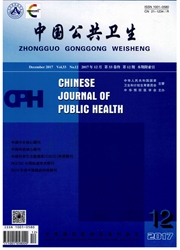

 中文摘要:
中文摘要:
目的探讨临床护士主观幸福感现状及其影响因素,为制定护理人员的健康心理指导提供参考。方法应用一般资料调查问卷、Campbell幸福感指数量表、领悟社会支持量表、一般自我效能感量表、自尊量表、简易应对方式问卷和生活定向测验修订版对291名在职护士进行匿名问卷调查。结果护士主观幸福感总均分为(10.75±1.94)分,社会支持为(65.55±9.86)分,自我效能为(2.50±0.53)分,自尊为(19.71±3.48)分,积极应对为(2.00±0.40)分,消极应对为(1.20±0.50)分,乐观倾向为(15.01±3.37)分;单因素分析表明,健康自评、月均收入、社会支持、积极应对、乐观倾向、自尊和自我效能感均为主观幸福感的可能影响因素(均P〈0.05);多元线性回归分析显示,社会支持、健康自评、乐观倾向、积极应对和月均收入均进入主观幸福感回归方程,共同解释主观幸福感总分的32.7%。结论临床护士主观幸福感总体状况较好,社会支持、健康自评、乐观倾向、积极应对和月均收入是护士主观幸福感的主要影响因素。
 英文摘要:
英文摘要:
Objective To investigate the subjective well-being (SWB) and its influencing factors among clinical nurses and to provide reference for mental health promotion in nursing staff. Methods A General Information Question- naire ,the Campbell Subjective Well-Being Scale, Perceived Social Support Scale, General Self-Efficacy Scale, the Self- Esteem Scale, Simplified Coping Style Questionnaire, and Revised Life Orientation Test were adopted to collect informa- tion in 291 on-the-job nurses. Results The average score was 10. 75 ± 1.94 for overall SWB, 65.55 ± 9.86 for social support,2. 50 ± 0. 53 for self-efficacy, 19.71 ± 3.48 for self-esteem,2. 00 ± 0. 40 for positive coping, 1.20 ± 0. 50 for negative coping, and 15.01 ± 3.37 for optimistic tendency, respectively. The self-assessment of health, monthly income, social support, positive coping, optimistic tendency, self-esteem, and self-efficacy had siznificant positive correlations with
 同期刊论文项目
同期刊论文项目
 同项目期刊论文
同项目期刊论文
 Toward integrated and sustainable prevention against diabetes in rural China: study rationale and pr
Toward integrated and sustainable prevention against diabetes in rural China: study rationale and pr Life events and chronic physical conditions among left-behind farmers in rural China a cross-section
Life events and chronic physical conditions among left-behind farmers in rural China a cross-section Relationships between stressful life events and impaired fasting glucose among left-behind farmers i
Relationships between stressful life events and impaired fasting glucose among left-behind farmers i Modeling Age-specific Cancer Incidences Using Logistic Growth Equations: Implications for Data Colle
Modeling Age-specific Cancer Incidences Using Logistic Growth Equations: Implications for Data Colle Association of risk of gastric cancer and consumption of tobacco, alcohol and tea in the Chinese pop
Association of risk of gastric cancer and consumption of tobacco, alcohol and tea in the Chinese pop Association between pancreatitis and subsequent risk of pancreatic cancer: a systematic review of ep
Association between pancreatitis and subsequent risk of pancreatic cancer: a systematic review of ep Effects of psycho-behavioral interventions on immune functioning in cancer patients: a systematic re
Effects of psycho-behavioral interventions on immune functioning in cancer patients: a systematic re Assessment and model guided cancer screening promotion by village doctors in China: a randomized con
Assessment and model guided cancer screening promotion by village doctors in China: a randomized con Psychosocial and Behavioral Interventions and Cancer Patient Survival Again: Hints of an Adjusted Me
Psychosocial and Behavioral Interventions and Cancer Patient Survival Again: Hints of an Adjusted Me 期刊信息
期刊信息
